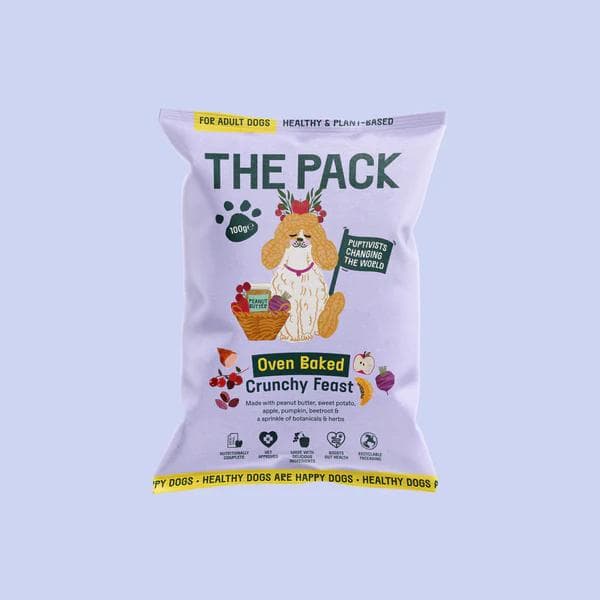Key Takeaways
- Planning ahead is important when switching your dog to a vegetarian diet: To keep your dog's health on a vegetarian diet, you need expert advice, a balanced diet, and regular health checks.
- Complete nutrition is possible: Dogs can do well on a vegetarian diet provided they get all the amino acids, vitamins, and minerals they need from properly chosen plant-based foods and, if needed, supplements.
- ** Plant proteins of good quality can take the place of animal proteins.** When lentils, chickpeas, quinoa, and soy are mixed together in the right way, they can give dogs the protein and nutrients they need.
- ** Not every dog can be a vegetarian.** Some breeds or canines with health problems may need nutrients from animals. Talk to your vet before changing your dog's food.
- ** Trusted products make safe transitions easier:** Vegetarian dog foods that have been approved by veterinarians and satisfy AAFCO standards make sure your dog gets all the nutrients they need in the right amounts.
- ** It's important to make the change slowly:** Mix vegetarian food with your dog's regular diet over the course of 7 to 10 days to make sure they don't have any digestive problems.
- ** Health checks should be done on a regular basis:** Regular visits to the doctor and lab testing will help you keep an eye on your dog's nutritional status and find any problems early on.
- ** Concentrate on important nutrients:** To keep your dog healthy, active, and happy, you should give taurine, L-carnitine, vitamin B12, and omega-3 fatty acids top priority.
- ** Tools and resources make feeding easier:** Recipes recommended by veterinarians and commercial choices that meet AAFCO standards make it easy to switch to a vegetarian diet without missing out on important nutrients.
Introduction
It might seem strange to put a dog on a vegetarian diet, but if you do it right, it can be a healthy and long-lasting decision. Dogs are naturally omnivores, which means they can get nourishment from both plants and animals. This flexibility to change makes it possible for many dogs to be vegetarians as long as their diet is carefully planned and managed by professionals. But this choice must take into account not only their nutritional needs but also their age, breed, and health concerns.
This all-in-one guide covers everything you need to know about vegetarian dog diets, from choosing nutrient-dense foods and professional-grade brands to recommendations for making the switch and keeping an eye on your dog's health over time. This guide will give you the information and resources you need to make confident, informed choices, whether you're looking into this option for ethical reasons, environmental concerns, or your pet's special health needs.
Basics of Vegetarian Dog Food
Dogs are omnivores, which means they eat both plants and animals. This makes plant-based meals possible when done correctly. Their bodies have special adaptations that help them digest and absorb nutrients from plant-based foods. This is a scientific reason for feeding them a well-balanced vegetarian diet.
The Science of Adapting to Being an Omnivore
Dogs have digestive systems that are suited for eating both plants and animals. Their saliva and pancreas contain amylase enzymes that help them break down carbs. Their medium-length digestive tracts are perfect for breaking down both plant fibres and animal proteins. Also, dogs can make some amino acids on their own, which means they don't need to get all of their protein from animal sources.
Modern advances in food science make it even easier for people to receive the nutrients they need from plant-based foods in commercial vegetarian diets. Fermentation and other particular cooking processes make proteins easier to digest and amino acids easier to absorb. This makes sure that plant-based foods have the same nutritional value as animal goods.
A study from 2021 in the Journal of Animal Science found that dogs fed professionally tailored vegetarian diets had equal health outcomes—measured by biomarkers like blood chemistry and body condition scores—as those fed normal meat-based diets. This shows that vegetarian feeding can work if the nutritional needs are carefully satisfied.
Dogs need nutrients, not certain ingredients.
Dogs don't need animal-based foods; they need certain nutrients like protein, amino acids, vitamins, and minerals. You can get these nutrients from plants as long as you mix them in the right way. For instance, lentils and quinoa together can make a whole amino acid profile that is as good as that of meat. Knowing this basic rule is the first step to feeding your vegetarian dog well.
To build a plant-based diet, you need to pay attention to balance and completeness to make sure that dogs get all the nutrients they need to stay healthy and full of energy.
Pros and Cons of a Vegetarian Diet
Benefits for the environment and ethics
The environmental impact of a vegetarian diet for dogs is one of its best features. Studies have found that producing plant-based protein consumes up to 60% less land, water, and other resources than producing animal protein. Vegetarian diets for dogs are a good way for pet owners to help the environment and lower their carbon impact.
Also, choosing a diet without meat may be in line with moral convictions, especially for families that want to live by cruelty-free standards in all areas of their lives.
Good for your health
For some dogs, a vegetarian diet may be good for their health in a number of ways. Plant-based diets that cut out common allergens like beef or chicken may help dogs with food allergies or sensitivities. People with inflammatory bowel disease (IBD) and other illnesses have found that hypoallergenic plant proteins like hydrolysed pea protein can help their symptoms a lot.
Vegetarian formulations, on the other hand, can help with weight management and digestive health because they are frequently low in calories and high in fibre. Fibrous foods help dogs feel full, which is good for dogs that are overweight or prone to becoming overweight. Some research and stories have also said that the hair and skin of some dogs get better, although this depends on the dog and the quality of its diet.
Problems in Feeding Vegetarians
Even while there are benefits, switching to a vegetarian diet requires careful planning to avoid missing out on important nutrients. Taurine, L-carnitine, and methionine are important amino acids that are found in meat. They may need to be added to plant-based formulas.
You also need to think about things that are distinctive to the breed. For instance, big breeds need to have the right amount of calcium and phosphorus in their diets while they are growing to avoid problems with their bones. Older dogs or dogs that need a lot of energy may not be able to get all the nutrients they need from a plant-based diet alone. They may need special formulas or extra supplements.
Changes to the digestive system can make things more difficult for a short time. When dogs switch from their usual meals to ones with more fibre and other protein sources, they may have gas or loose stools while their microbiome adjusts. Monitoring and slowly introducing things can help with these transition effects, but they take time and effort.
How to Get All the Nutrients You Need on a Vegetarian Diet
What Protein and Amino Acids Do
Proteins are an important part of a dog's diet, but they need to be balanced so that they have all the amino acids they need. Lentils, chickpeas, and quinoa all have amino acid compositions that work well together for dogs. Soy is a complete protein that is also cheap and used a lot in vegetarian cuisine. Hemp protein has extra health benefits, such as omega-3s, although the quality can vary from batch to batch.
Focus on Micronutrients
You need to pay attention to important micronutrients like zinc and vitamin B12. Since plants don't have B12, you need to eat fortified foods or take supplements. In the same way, vitamin C should be taken with plant-based iron sources to make sure that the body gets enough iron. It is important to get enough omega-3 fatty acids, which are commonly found in algae-based DHA supplements.
Making Sure Foods Are Safe by Following AAFCO Guidelines
Vegetarian companies that follow AAFCO guidelines, including V-Dog and Natural Balance, make it easier for pet owners to keep their pets' diets comprehensive and balanced. Home-cooked foods are flexible, but they need to be watched by a vet to make sure there are no nutrient shortages or wrong ratios.
Conclusion
It is possible to switch your dog to a vegetarian diet if you prepare ahead and seek help from a specialist. Dogs may stay healthy on meatless diets by getting high-quality plant proteins and essential nutrients. This is because they evolved to be omnivores and can adapt to different foods. The technique has many benefits, including helping the environment and dealing with health issues like obesity and allergies.
But it is their job to make sure that the nourishment is complete. You need to be very attentive about things like the amino acid content, vitamin supplements (particularly B12), and breed or age-specific needs. Commercial vegetarian diets make this procedure easier, but when you cook for your dog at home, you need to be very careful to make sure they get everything they need.
A vegetarian diet can be good for your dog and fit with your values if you do some research, talk to your vet, and are patient. In the end, the success of this kind of shift depends on your commitment to finding a balance between giving your pet a diet that supports their long-term health and meeting their specific dietary needs.






